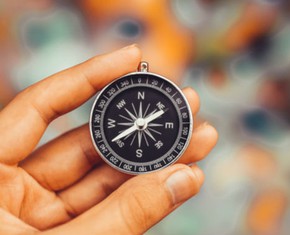The views expressed in our content reflect individual perspectives and do not represent the authoritative views of the Baha'i Faith.
How can we increase our knowledge of God? The first step in that quest goes through the portal of self. Right from our initial moment of existence we must grow in order to cope with life. Growth never stops.
Our physical, intellectual, emotional, and spiritual well-being all depend on that never-ending journey of growth and discovery.
In addition to our capacities, the relationships we develop provide us with a foundation for life. Our first relationships are with our mother, father, and siblings. Later we get to know friends, neighbors, teachers, co-workers, a spouse, children, and grandchildren. Life becomes an expansion of human experience. Some relationships we choose, some are thrust upon us, and others we discard. Our interactions with others provide opportunities to gain a better understanding of qualities such as love, trust, patience, kindness and forgiveness. When we make a conscious effort to turn our attention towards divine attributes rather than seeking vices, the self transforms itself from potential to reality. Step by step, it grows closer to the Divine Self. According to Abdu’l-Baha: “With the human soul … Its only movement is towards perfection … Divine perfection is infinite, therefore the progress of the soul is also infinite.”
RELETAD: True Justice: De-Colonizing Our Consciousness
What processes, then, can lead us toward spiritual perfection?
Let’s consider a mirror. When turned towards the sun, it reflects light. If it is kept in the darkness, it will reflect nothing. Also, if the mirror is dirty, although turned towards the sun, it will reflect only some of its light. Similar to a mirror, when the soul turns towards God and ponders His attributes, it will come to reflect many facets of goodness. The more polished the soul, through the growth and development of human virtues, the more we will see in it the reflection of God’s beauty.
Throughout history, human beings have gained their knowledge of God through His messengers. Our recorded history recognizes some of them as the founders of great Faiths: Abraham, Krishna, Zoroaster, Buddha, Moses, Jesus, Mohammad, and most recently the Bab and Baha’u’llah. They all served as direct links between the Creator and creation. Though they appear in this world in human form, these divine messengers differ from us in many significant ways.
Unlike ordinary humans, the holy prophets and messengers reflect all the attributes of God – they are perfectly polished mirrors. According to Baha’u’llah, God “… hath ordained the knowledge of these sanctified Beings to be identical with the knowledge of His own Self.”
Each of these prophets brought a divine message for the age in which they appeared. Unfortunately, with the passage of time the pure heavenly water they shower over humankind is muddied through misunderstandings, corruptions, and dogmas. Each time new messengers appear on Earth, they first refresh the existing spiritual teachings by adding, changing, or removing principles, laws, and practices of previous religions, according to the capacity and needs of the people. This process of divine revelation helps souls move closer to their Creator, promotes unity and concord, and allows civilization to advance materially and spiritually. But religious rituals and traditions, when they lose the light of truth and are reduced to outer forms, can become barriers, limiting people from recognizing God’s messages.
RELATED: Finding Knowledge in a Dream — With Adam Robarts
That’s why religion must be renewed from time to time. As the Baha’i teachings say:
The religion of God is one religion, but it must ever be renewed. Moses, for example, was sent forth to man and He established a Law, and the Children of Israel, through that Mosaic Law, were delivered out of their ignorance and came into the light; they were lifted up from their abjectness and attained to a glory that fadeth not. Still, as the long years wore on, that radiance passed by, that splendour set, that bright day turned to night; and once that night grew triply dark, the star of the Messiah dawned, so that again a glory lit the world.
Our meaning is this: the religion of God is one, and it is the educator of humankind, but still, it needs must be made new. When thou dost plant a tree, its height increaseth day by day. It putteth forth blossoms and leaves and luscious fruits. But after a long time, it doth grow old, yielding no fruitage any more. Then doth the Husbandman of Truth take up the seed from that same tree, and plant it in a pure soil; and lo, there standeth the first tree, even as it was before.
Note thou carefully that in this world of being, all things must ever be made new. Look at the material world about thee, see how it hath now been renewed. The thoughts have changed, the ways of life have been revised, the sciences and arts show a new vigour, discoveries and inventions are new, perceptions are new. How then could such a vital power as religion – the guarantor of mankind’s great advances, the very means of attaining everlasting life, the fosterer of infinite excellence, the light of both worlds – not be made new? This would be incompatible with the grace and loving-kindness of the Lord.
The Baha’i principles tell us that essence of all religions, their spiritual teachings, is the same. For example, kindness, generosity and compassion are not only for Christians: they are part of the core beliefs of all religions.
These holy messengers bring us eternal spiritual teachings as well as social laws based on the needs of the time, so that civilization can flourish and humans can live in harmony. Every time these divine educators appear, through their examples and words we reach a higher plane of our understanding of the Creator.
















Comments
Sign in or create an account
Continue with Googleor